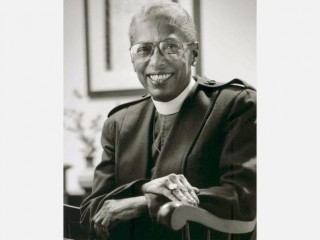
Barbara Harris (bishop) biography
Date of birth : 1930-06-12
Date of death : -
Birthplace : Philadelphia, Pennsylvania
Nationality : American
Category : Famous Figures
Last modified : 2011-01-05
Credited as : Woman bishop, ,
In 1989, Barbara Clementine Harris became the first woman bishop in the Worldwide Anglican Communion. Prior to this appointment, Harris was a noted social activist, and her views on social issues continue to inform her actions as a religious leader.
Destined never to take the well-traveled or easy path to success, Barbara Clementine Harris made history in 1989 when she became the first woman bishop in the Worldwide Anglican Communion. Harris, an African American Episcopal pastor, had always chosen to be a leader and not a follower, both within and outside her church. Her elevation to bishop amazed many, as it provided a towering example of how far women had come in their struggle for equality in mainline Protestant churches. Harris's goal was to extend the boundaries of her church, continually pushing for a more progressive message from Episcopalians on issues of civil rights, sexism, and fairness. Harris's history as a social activist before joining the priesthood remained ingrained and served as a guide in all her religious actions.
Harris was born on 12 June 1930 in Philadelphia, Pennsylvania. As a youth Harris attended Saint Barnabas Episcopal Church in Philadelphia and developed a strong relationship with her church and its vision. Harris completed high school and enrolled in college, but did not complete her course work. In 1958 a public relations firm, Joseph Baker Associates, hired Harris, believing that she had great potential to enter this field and succeed. Two years later, Harris married. The relationship was short-lived and she was divorced by 1963. Politically, Harris was greatly affected by her surroundings. As a young African American woman, she felt it her duty to be a part of the civil rights struggle. Her participation in freedom rides, voter registration, and marches with Dr. Martin Luther King in Selma, Alabama, focused Harris's attention on the importance of fighting injustice and inequality. She went on to work as a chief public relations executive at the Sun Oil Company but always held her interests in the Episcopal Church, religion, and in the struggle for justice. Harris's voice increased in the church in 1974 when she lent her support to a group of Episcopal bishops who defied a ban on ordaining women as priests. Harris became so engulfed in the issue of women's rights in the church that she contemplated becoming a priest herself. By October 1980 her dream became a reality as she was ordained. Harris's early assignments varied from serving as chaplain in a Philadelphia County prison and working in small parishes to becoming executive director of the Episcopal Church Publishing Company. While at the publishing company Harris wrote for the liberal Episcopal magazine Witness and began to receive worldwide coverage in the Anglican community.
Harris's ascension as bishop was a major event in the religious world. The Lambeth Conference, the once-a-decade meeting of the international Anglican hierarchy, decided in early August 1988 to allow for the ordination of women as bishops in the church, and this decision set the stage for Harris to be elected. Her election in September 1988 to be the Episcopal bishop for the state of Massachusetts occasioned great celebration as well as turmoil. She defeated many prominent candidates, including other female priests, in order to achieve her status. In response to her victory counterprotests were launched. Several conservative priests revolted, some breaking ties with the church completely, while top Anglican leaders, such as Robert Runcie, the archbishop of Canterbury, refused to acknowledge female bishops in England. Ecumenical ties between the Roman Catholic Church and the Anglican Church were also strained as the Catholic Church wholeheartedly opposed women entering the priesthood. Harris, for her part, took the controversy in stride and did not let the spotlight detract her from her mission. She had always been outspoken, and she was willing to battle potential challenges to her election as bishop, a stand that won her the admiration of many of her critics.
Once elected and consecrated bishop, Harris continued to advocate for diversity in the Episcopal Church and the entire Anglican community. Her command of a 96, 000-member Boston-based diocese made her a powerful force to be reckoned with in deciding church policy and programs. Realizing that with great power came greater responsibility, Harris toned down her rhetoric but did not alter her message. She remains what she always was—an activist critic of the status quo who constantly strives to break new ground.
Larry G. Murphy, J. Gordon Melton, and Gary L. Ward, eds., Encyclopedia of African American Religions (New York: Garland, 1993).
















